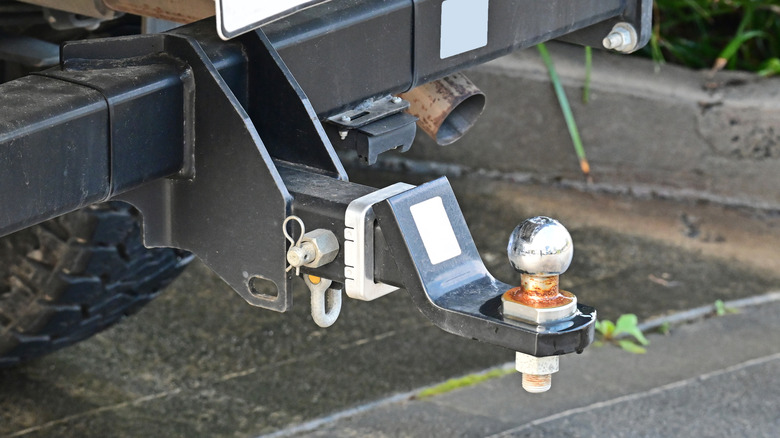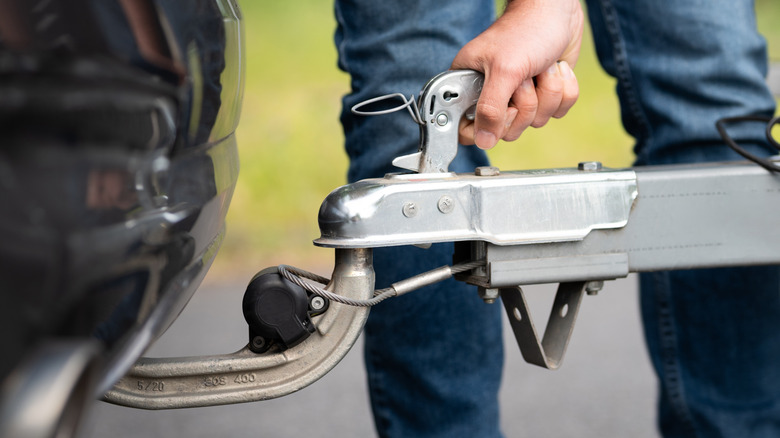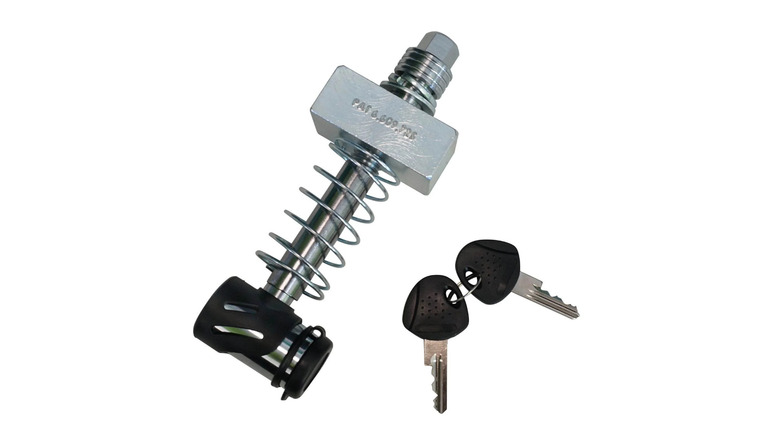Why Your Car's Tow Hitch Is Rattling (And How To Fix It)
Regardless of whether you own a Ford Super-Duty and are towing heavy loads all day long, or if you just take a small box trailer around locally every once in a blue moon on the back of your time-tested Suzuki, one thing that is guaranteed to wind you up is a rattling tow hitch. First of all, it can be tricky to diagnose at first, and it may leave you lying underneath your ride trying to establish which suspension component is causing noise. Fortunately, though, once you have realized that the metallic clanking and rattling is coming from the tow hitch, it's not all that complicated to get it rectified.
It's also worth noting that, while a rattling tow hitch is definitely annoying, it's also a safety concern, so this isn't something you should just learn to live with. Ultimately, it hints at a loose connection, and depending upon where this is, you could find excessive trailer sway when next on the move. There are enough risks to watch out for when towing on the road as it is, without adding extra unwanted movement due to something as simple and correctable as a rattling hitch.
Thankfully, there is a solution for every problem. Relating to a rattling tow hitch, the solution could be an anti-rattle hitch pin, a silent hitch pin, a hitch tightener clamp, cheap DIY solutions, or simply some much-needed maintenance.
How to narrow down the cause of your concern
First of all, you need to identify the cause of your noise. Rattling usually indicates a loose connection in the receiver or ball mount, whereas squeaking suggests friction, and popping hints at weight distribution or suspension issues. Different styles of hitches will also produce different noises. Ball mount and weight distribution hitches are often found to rattle, whereas fifth-wheel and pintle hitches tend to produce different noises.
Taking a quick visual inspection is a wise move, and if you see a loose connection, that's likely your rattling culprit — so get this tightened up asap — while also investigating to see if there's an obvious reason why it's loose in the first place. Look out for worn hitch pins, an improperly tightened coupler, or a loose hitch ball. This is also a great opportunity to apply lubrication to moving parts, to help keep things moving as sweetly as they should be.
Think also about what's causing these issues — are you frequently off-roading, or bouncing in and out of aggressive local potholes? Such surfaces are more likely to cause wear and tear on your tow hitch and cause issues. If such driving sounds familiar, you should definitely think about doubling down on your tow hitch inspections and maintenance, as it's always preferable to catch a failure before it happens.
The solutions to your rattling troubles
Once you've established that the rattle isn't due to some sort of dangerous pending failure, and have considered simple fixes, like tightening up loose connections and lubrication of moving parts, we can look at future-proofing that tow hitch of yours. Additions such as an anti-rattle hitch pin or silent hitch pin can be just the solution you've been searching for.
These solutions work by eliminating up, down, and side-to-side movement between the various components of your tow hitch to ensure a tight, snug fit. As such, no rattle. They're easy to install and affordable too, which is what makes them such a popular solution.
You might also want to consider a hitch-tightener clamp, which is very affordable and usually universal. They work by wrapping around the hitch receiver, and once tightened, they securely and snugly hold the various components in place. Solutions like these are great and can really transform how a vehicle tows by keeping everything tight, in place, and quiet. However, fitting devices like this are not an excuse to forego regular inspections and maintenance of your tow hitch setup, so don't forget to regularly consider those aforementioned steps in order to ensure you're towing safely and quietly.


